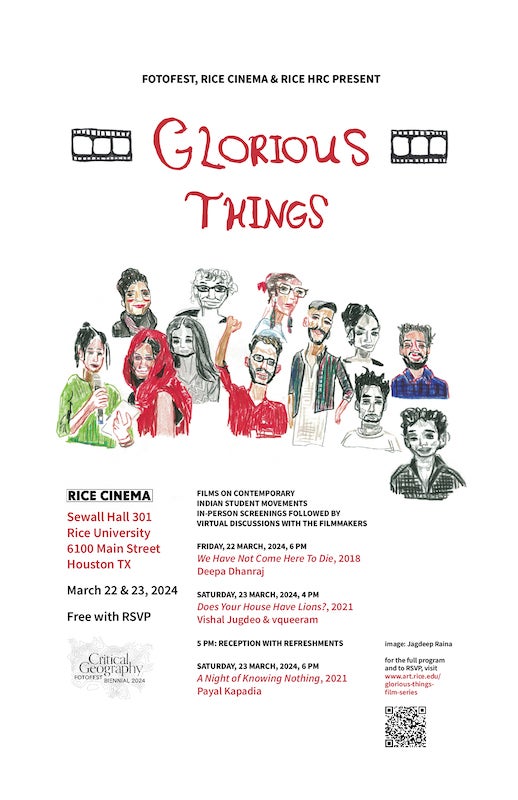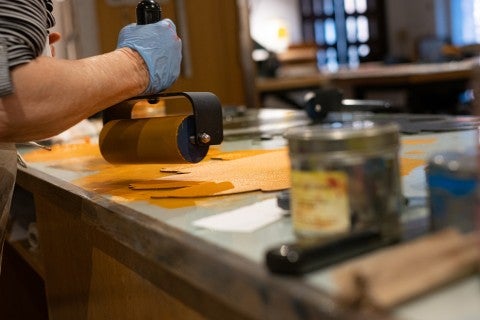GLORIOUS THINGS
March 22 & 23, 2024
Cosponsored by Rice Cinema, Rice Humanities Research Center, and FotoFest
Curated by filmmaker and Assistant Professor of Art, Sindhu Thirumalaisamy
This program brings together three critically acclaimed films that vividly articulate the stakes of contemporary campus politics and student life in India. The films in this series, all made within the last five years, look at universities as sites of intensifying authoritarianism, centering the perspectives of Dalit-Bahujan, working-class, queer, and trans students, artists and intellectuals. Working through friendships in modes that are essayistic and experimental, these films weave together multiple voices and video sources across mediascapes that are increasingly censored. Throughout this series, we are reminded that cinema—as an artform, as an experience, and as a social space—is necessary for resistance.
All screenings will take place at Rice Cinema: Sewall Hall, room 301.
RSVP required. See links below.

FRIDAY, March 22, 6:00 PM
We Have Not Come Here to Die
Directed by Deepa Dhanraj
(India, 2018, 110 min.)
Followed by a virtual Q&A with Deepa Dhanraj, moderated by Sindhu Thirumalaisamy
RSVP
Rohith Vemula, a Dalit Ph.D research scholar and activist at University of Hyderabad who was persecuted by the university administration and Hindu supremacists, died of suicide on January 17, 2016. His suicide note, which argued against the “value of a man being reduced to his immediate identity” galvanized student politics and solidarity movements. The ensuing outrage gave rise to protests across India, calling the neglectful treatment and systemic oppression faced by Dalit people into question, and encouraging solidarity with minority groups facing similar discrimination from Hindu nationalists, students, administration and aligned governing authorities. The film attempts to track this historic movement that is changing the conversation on caste in India.
SATURDAY, March 23, 4:00 PM
Does Your House Have Lions?
Directed by Vishal Jugdeo & vqueeram
(India, 2021, 49 min.)
Discussion with Vishal Jugdeo, vqueeram, and Lakshmi Padmanabhan to take place at the end of the program (7:45pm)
RSVP
Does Your House Have Lions? is an experimental documentary by the Delhi-based poet vqueeram and Los Angeles-based artist Vishal Jugdeo. It is the latest iteration of their ongoing, transoceanic collaborative practice and friendship. Shot in Delhi, Bombay, and Goa, the film follows vqueeram and their housemates Dhiren Borisa, Natasha Narwal, Devangana Kalita and Andre Ling—friends, lovers, and co-conspirators in activism and survival—against a four-year backdrop of turbulent political developments throughout India.
SATURDAY, March 23, 5:00–6:00 PM
Reception at Rice Welcome Center Foyer (centrally located on the ground floor of Sewall Hall)
SATURDAY, March 23, 6:00 PM
A Night of Knowing Nothing
Directed by Payal Kapadia
(India, 2021, 97 min.)
Followed by a discussion with Vishal Jugdeo, vqueeram, and Lakshmi Padmanabhan, moderated by Sindhu Thirumalaisamy
RSVP
Winner of the Oeil d'Or (Best Documentary) at Cannes Film Festival.
Through fictional love letters found in a cupboard at the Film and Television Institute of India, we meet L, a film student writing to her estranged lover while he is away. Gradually we’re immersed in the drastic changes taking place at the school and in the lives of young people across the country as they take to the streets to protest widespread discrimination.
In her multiple award winning debut film, Payal Kapadia deftly merges reality with fiction, weaving together archival footage with student protest videos to create a vital tapestry of the personal and the political. With its dreamlike editing rhythms and a revelatory use of sound, A Night of Knowing Nothing? is both an essential document of contemporary India and a nostalgic look at youth fighting the injustice of their time.
“One of the best student films ever made...imbue[d] with a sense of history unfolding in the moment.” —Siddhant Adlakha, Indiewire
ABOUT THE FILMMAKERS & SPEAKERS
Award-winning filmmaker and writer Deepa Dhanraj has been part of the women's movement in India since 1980. She was one of the founding members of Yugantar, a feminist film collective that made a series of films in the early 1980s documenting rural and urban women's movements for labor rights and autonomy. Focused on feminist politics, Deepa's extensive filmography spans three decades and subjects including population control programs in India, Muslim women's courts, the rise of Hindu majoritarianism, community efforts to combat HIV/AIDS, and more. She has a special interest in education and has worked closely with government schools to create pedagogy suited for problems faced by first-generation learners who come from Dalit and Adivasi communities.
Vishal Jugdeo (b. 1979 Regina, Canada, lives and works in Los Angeles, USA) works with video, performance and installation to construct experimental narratives. His work considers the relational and psychical processes of image-making, often blurring fiction and document. Jugdeo is a 2015 Guggenheim Foundation Fellow, and New Genres area head in the Department of Art at UCLA.
vqueeram is currently Visiting Faculty at the School of Culture and and Creative Expressions at Ambedkar University, Delhi. They live and love in Delhi.
Payal Kapadia is a Mumbai-based filmmaker and artist. She studies Film Direction at the Film & Television Institute of India. Her short films Afternoon Clouds and And What is the Summer Saying premiered respectively at the Cinéfondation and the Berlinale. Her first feature length film, A Night of Knowing Nothing, was selected for Director’s Fortnight, Cannes 2021, where it won the Golden Eye Prize for Best Documentary. Her next project, All We Imagine As Light, which received support from CICLIC, Hubert Bals Fund & PJLF Arts Fund, is currently in development.
Lakshmi Padmanabhan is an assistant professor in the department of Radio, TV, Film at Northwestern University. Their current academic book project examines the aesthetics of the independent documentary and the failed dreams of decolonization in India from the 1970s to the present. Padmanabhan is the editor of the volume Forms of Errantry on the films of Miryam Charles. Their academic writing has appeared in journals including Art History, Camera Obscura, Cultural Critique, JCMS, Women & Performance, and New Review of Film and Television. Their essays, criticism and reviews have been published in e-flux, Seen, Public Books, Jewish Currents, and Post45. They have also curated experimental film and video art at venues including e-flux screening room, DocLisboa, Block Museum, BRIC Arts and Magic Lantern Cinema, in Providence, RI.
All screenings in this series are free and open to the public.
Discounted parking is available at Founder’s Court, at a flat rate of $6. Credit card is required.

